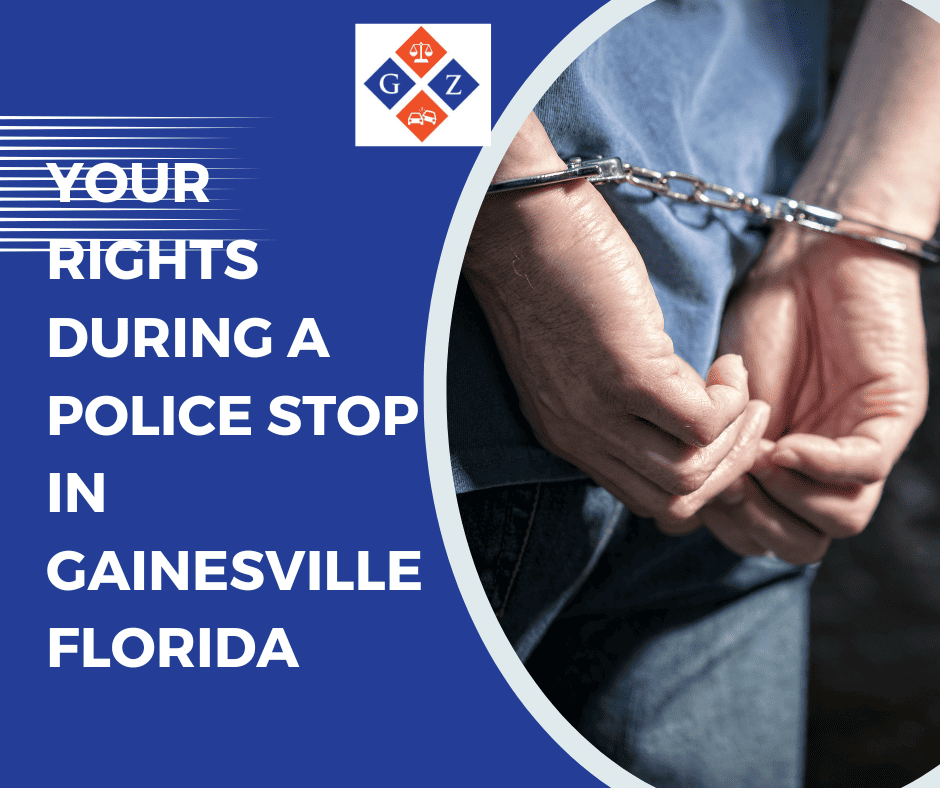Have you ever found yourself in the rearview mirror gaze of flashing blue lights in Gainesville, Florida? It’s a scenario that can range from mildly inconvenient to deeply unsettling. Understanding your rights during a police stop can keep the situation from escalating and protect your legal interests. Here’s a straightforward guide to help you navigate these encounters with confidence.
1. Remain Calm and Collected
First things first: take a deep breath. Keeping calm is crucial. Pull over safely, turn off your car, and turn on the interior light if it’s dark. This isn’t just about being courteous; it’s about ensuring both your safety and the officer’s.
2. The Power of Politeness
When the officer approaches, be polite. This doesn’t mean you have to be overly friendly, but a little courtesy goes a long way. Provide your driver’s license, registration, and insurance when asked. Remember, being polite doesn’t mean you have to consent to everything.
3. To Speak or Not to Speak
You have the right to remain silent; sometimes, it’s wise to use it. If you choose to answer questions, keep your answers short and to the point. However, lying to an officer is not okay – it’s not just frowned upon; it’s illegal.
4. Understanding Search Protocols
Can the officer search your car? Well, it’s complicated. They don’t need your permission if they have probable cause (think visible contraband or the scent of something illegal). However, without probable cause, they need your consent. It’s your right to politely refuse a search if asked. But remember, if they insist they have probable cause, it’s better to comply and contest it later in court than to resist. Don’t try to fight an illegal search at the scene. Communicate clearly that you do not consent and then keep quite. If you are arrested, your lawyer can challenge the legality of the stop in court.
5. Stepping Out of the Vehicle
If asked to step out of the vehicle, do so. Resisting this request can escalate the situation. Once out, you’re within your rights to ask if you’re free to leave. If you’re not under arrest, you should be allowed to go.
6. Recording the Encounter
In Florida, there is some contradictory information about recording a police encounter. It’s legal to record your interactions with police, as long as it doesn’t interfere with their duties, but the situation is a lot more nuanced than that. If you decide to record, inform the officer. It’s about transparency, not confrontation. It is always important to remember that in Florida it is illegal to record someone if they are in a place where they have an expectation of privacy and have not given consent to the recording.
7. Arrested? Remain Silent and Seek Legal Counsel
If the stop leads to an arrest, exercise your right to remain silent and request an attorney immediately. Anything you say can be used against you, so waiting for legal guidance is better.
Knowledge is Power
Traffic stops can be nerve-wracking, but knowing your rights is empowering. Stay calm, be polite, understand your rights regarding searches and speaking, and if things escalate, seek legal help. Remember, a traffic stop is not a courtroom; it’s not the place to argue your case. That’s what lawyers and courtrooms are for.
Call Glassman and Zissimopulos and our team of dedicated attorneys today. (352) 505-4515 or Toll-Free at (844) 787-2543. When you call, you will be able to speak with a lawyer. This is our commitment to you.


0 Comments